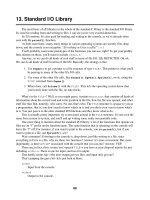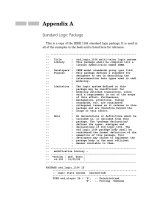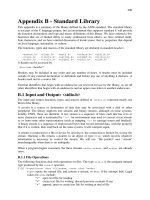Standard Template Library
Bạn đang xem bản rút gọn của tài liệu. Xem và tải ngay bản đầy đủ của tài liệu tại đây (725.3 KB, 56 trang )
Copyright © 2007 Pearson Education, Inc. Publishing as Pearson Addison-Wesley
Chapter 18
Standard Template Library
Slide 18- 3
Copyright © 2007 Pearson Education, Inc. Publishing as Pearson Addison-Wesley
Overview
18.1 Iterators
18.2 Containers
18.3 Generic Algorithms
Copyright © 2007 Pearson Education, Inc. Publishing as Pearson Addison-Wesley
18.1
Iterators
Slide 18- 5
Copyright © 2007 Pearson Education, Inc. Publishing as Pearson Addison-Wesley
Iterators
STL has containers, algorithms and Iterators
Containers hold objects, all of a specified type
Generic algorithms act on objects in
containers
Iterators provide access to objects in the
containers yet hide the internal structure of the
container
Slide 18- 6
Copyright © 2007 Pearson Education, Inc. Publishing as Pearson Addison-Wesley
Using Declarations
Using declarations allow use of a function or
name defined in a namespace:
using ns::fun( );
using ns::iterator;
using std::vector<int> ::iterator;
Slide 18- 7
Copyright © 2007 Pearson Education, Inc. Publishing as Pearson Addison-Wesley
Iterator Basics
An iterator is a generalization of pointer
Not a pointer but usually implemented using
pointers
The pointer operations may be overloaded for
behavior appropriate for the container internals
Treating iterators as pointers typically is OK.
Each container defines an appropriate iterator
type.
Operations are consistent across all iterator
types.
Slide 18- 8
Copyright © 2007 Pearson Education, Inc. Publishing as Pearson Addison-Wesley
Basic Iterator Operations
Basic operations shared by all iterator types
++ (pre- and postfix) to advance to the next data item
= = and != operators to test whether two iterators point
to the same data item
* dereferencing operator provides data item access
c.begin( ) returns an iterator pointing to the first element
of container c
c.end( ) returns an iterator pointing past the last
element of container c. Analogous to the null pointer.
Unlike the null pointer, you can apply -- to the
iterator returned by c.end( ) to get an iterator
pointing to last element in the container.
Slide 18- 9
Copyright © 2007 Pearson Education, Inc. Publishing as Pearson Addison-Wesley
More Iterator Operations
-- (pre- and postfix) moves to previous data item
Available to some kinds of iterators.
*p access may be read-only or read-write
depending on the container and the definition of
the iterator p.
STL containers define iterator types appropriate
to the container internals.
Some containers provide read-only iterators
Slide 18- 10
Copyright © 2007 Pearson Education, Inc. Publishing as Pearson Addison-Wesley
Kinds of Iterators
Forward iterators provide the basic operations
Bidirectional iterators provide the basic
operations and the -- operators (pre- and
postfix) to move to the previous data item.
Random access iterators provide
The basic operations and –
Indexing p[2] returns the third element in the
container
Iterator arithmetic p + 2 returns an iterator to
the third element in the container
Slide 18- 11
Copyright © 2007 Pearson Education, Inc. Publishing as Pearson Addison-Wesley
Constant and Mutable Iterators
Categories of iterator divide into constant and
mutable iterator.
Constant Iterator cp does not allow assigning
element at p
using std::vector<int>::const_iterator;
const_iterator cp = v.begin( );
*cp = something; // illegal
Mutable iterator p does allow changing the
element at p.
using std::vector<int>::iterator;
iterator p = v.begin( );
*p = something; // OK
Slide 18- 12
Copyright © 2007 Pearson Education, Inc. Publishing as Pearson Addison-Wesley
Reverse Iterators
A reverse iterator enables cycling through a
container from the end to the beginning. Reverse
iterators reverse the more usual behavior of ++
and –
rp-- moves the reverse iterator rp towards the
beginning of the container.
rp++ moves the reverse iterator rp towards the
end of the container.
reverse_iterator rp;
for(rp = c.rbegin( ); rp != c.rend( ); rp++)
process_item_at (rp);
Object c is a container with bidirectional iterators
Slide 18- 13
Copyright © 2007 Pearson Education, Inc. Publishing as Pearson Addison-Wesley
Other Kinds of Iterators
Two other kinds of (weaker) iterator –
An input iterator is a forward iterator that can
be used with input streams.
An output iterator is a forward iterator that can
be used with output streams.
Copyright © 2007 Pearson Education, Inc. Publishing as Pearson Addison-Wesley
18.2
Containers
Slide 18- 15
Copyright © 2007 Pearson Education, Inc. Publishing as Pearson Addison-Wesley
Containers
The STL provides three kinds containers:
Sequential Containers are containers where
the ultimate position of the element depends
on where it was inserted, not on its value.
Container Adapters use the sequential
containers for storage, but modify the user
interface to stack, queue or other structure.
Associative Containers maintain the data in
sorted order to implement the container’s
purpose. The position depends on the value of
the element.
Slide 18- 16
Copyright © 2007 Pearson Education, Inc. Publishing as Pearson Addison-Wesley
Sequential Containers
The STL sequential containers are the list,
vector and deque. (The slist is not in the STL.)
Sequential means the container has a first,
element, a second element and so on.
An STL list is a doubly linked list.
An STL vector is essentially an array whose
allocated space can grow while the program runs.
An STL deque (“d-que” or “deck”) is a “double
ended queue”. Data can be added or removed at
either end and the size can change while the
program runs.
Slide 18- 17
Copyright © 2007 Pearson Education, Inc. Publishing as Pearson Addison-Wesley
Common Container Members
The STL sequential containers each have
different characteristics, but they all support these
members:
container( ); // creates empty container
~container( ); // destroys container, erases all
members
c.empty( ) // true if there are no entries in c
c.size( ) const; // number of entries in container c
c = v; //replace contents of c with contents of v
Slide 18- 18
Copyright © 2007 Pearson Education, Inc. Publishing as Pearson Addison-Wesley
More Common Container Members
c.swap(other_container); // swaps contents of
// c and other_container.
c.push_back(item); // appends item to container c
c.begin( ); // returns an iterator to the first
// element in container c
c.end( ); // returns an iterator to a position
// beyond the end of the container c.
c.rbegin( ); // returns an iterator to the last element
// in the container. Serves to as start of
// reverse traversal.
Slide 18- 19
Copyright © 2007 Pearson Education, Inc. Publishing as Pearson Addison-Wesley
More Common Container Members
c.rend( ); // returns an iterator to a position
// beyond the of the container.
c.front( ); // returns the first element in the
// container (same as *c.begin( );)
c.back( ); //returns the last element in the container
// same as *(--c.end( ));
c.insert(iter, elem); //insert copy of element elem
//before iteIr
c.erase(iter); //removes element iter points to,
// returns an iterator to element
// following erasure. returns c.end( ) if
// last element is removed.
Slide 18- 20
Copyright © 2007 Pearson Education, Inc. Publishing as Pearson Addison-Wesley
More Common Container Members
c.clear( ); // makes container c empty
c1 == c2 // returns true if the sizes equal and
// corresponding elements in c1 and c2 are
//equal
c1 != c2 // returns !(c1==c2)
c.push_front(elem) // insert element elem at the
// front of container c.
// NOT implemented for vector due to large
// run-time that results
Slide 18- 21
Copyright © 2007 Pearson Education, Inc. Publishing as Pearson Addison-Wesley
PITFALL:
Iterators and Removing Elements
Removing elements will invalidates some
iterators.
erase member returns an iterator pointing to the
next element past the erased element.
With list are we guaranteed that only iterators
pointing to the erased element are invalidated.
With vector and deque, treat all operations that
erase or insert as invalidating previous iterators.
Slide 18- 22
Copyright © 2007 Pearson Education, Inc. Publishing as Pearson Addison-Wesley
Operation Support
X - Xsort( ) Sort
(X) X (X)erase(iter ) Delete in middle
(X) X (X)insert(e)Insert in middle
X X Xpop_back( )Delete at back
X X -pop_front( )Delete at front
X X Xpush_back(e) Insert at back
X X -push_front(e)Insert at front
dequeListvectorFunctionOperation
(X) Indicates this operation is significantly slower.
Slide 18- 23
Copyright © 2007 Pearson Education, Inc. Publishing as Pearson Addison-Wesley
The Container Adapters
stack and queue
Container Adapters use sequence containers for storage
but supply a different user interface.
A stack uses a Last-In-First-Out discipline.
A queue uses a First-In-First-Out discipline.
A priority queue keeps its items sorted on a property of
the items called the priority, so that the highest priority
item is removed first.
The deque is the default container for both stack and
queue.
A vector cannot be used for a queue as the queue
requires operations at the front of the container.
Slide 18- 24
Copyright © 2007 Pearson Education, Inc. Publishing as Pearson Addison-Wesley
Container Adapter stack
Declarations:
stack<T> s; // uses deque as underlying store
stack<T, underlying_container> t ; //uses the specified
//container as underlying container for stack
Stack<T> s (sequence_container); // initializes stack to
// to elements in sequence_container.
Header:
#include <stack>
Defined types:
value_type, size_type
No iterators are defined.
Slide 18- 25
Copyright © 2007 Pearson Education, Inc. Publishing as Pearson Addison-Wesley
stack Member Functions
true if sizes same and corresonding pairs
of elements are equal, else false
s1 = = s2
void function. Removes top of stack.s.pop( )
void Inserts copy of elem on stack tops.push(elem)
reference to top stack member s.top( )
true if no elements in stack else false s.empty( )
number of elements in stacks.size( )
ReturnsMember function
Sample Member Functions








![S]r dụng điều khiển Standard](https://media.store123doc.com/images/document/13/to/jm/medium_eiHM2giIEi.jpg)
